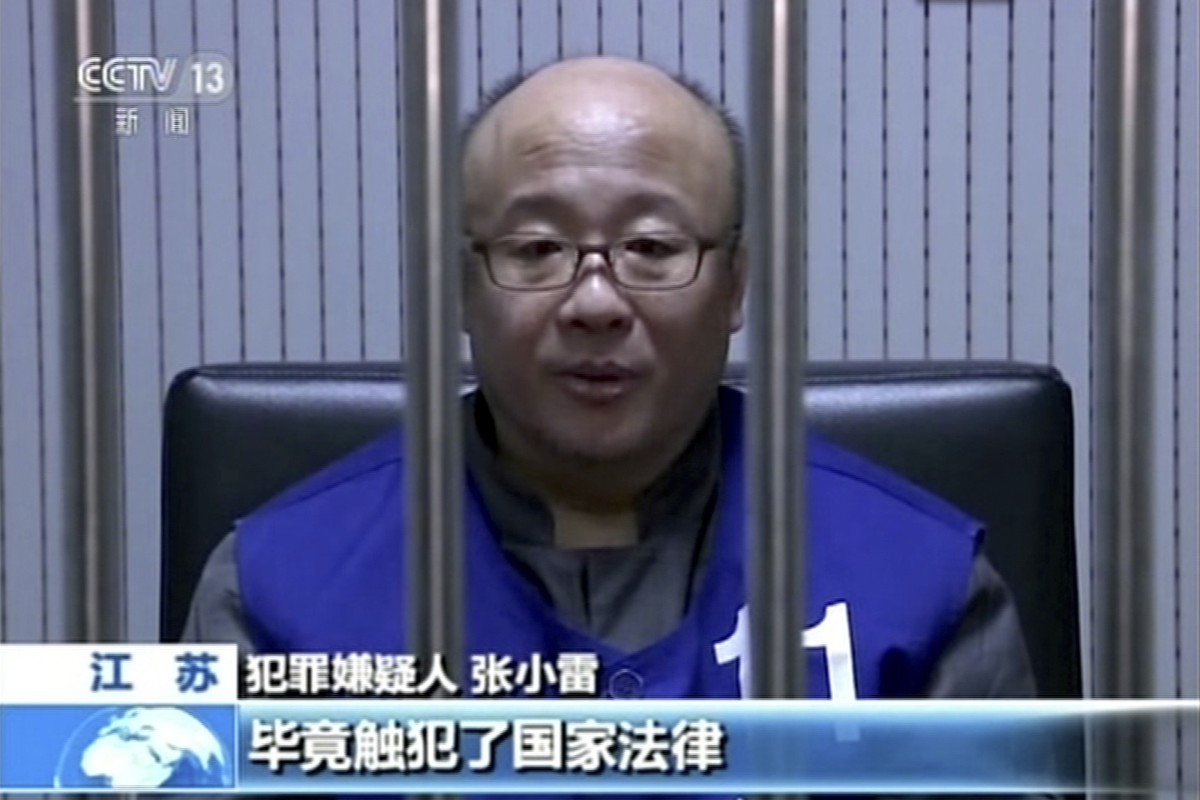Zhang Xiaolei, founder of Chinese fintech firm Qbao, to serve 15-year jail firm for fraudulent fundraising
Zhang Xiaolei founded the online fundraising platform Qbao in 2012
Court confiscates 100 million yuan worth of Zhang’s assets for his role in the illegal fundraising scheme
Daniel Ren
Published: 5:37pm, 21 Jun, 2019

In this image taken from an undated video footage run by China’s CCTV, Qbao’s founder Zhang Xiaolei speaks with police while in custody in Nanjing in eastern China’s Jiangsu province. Photo: CCTV via AP Video
Zhang Xiaolei, a prominent figure in China’s fintech sector, was sentenced to 15 years in prison for his involvement in a Ponzi scheme that involved at least 50 billion yuan (US$7.25 billion) of investors’ money.
The Nanjing Intermediate People’s Court in Jiangsu province handed down the punishment to Zhang, 50, after charging him with financial fraud and embezzling depositors’ money through illegal fundraising, and confiscated 100 million yuan of his assets, Xinhua reported on Friday.
Zhang, who founded Qbao.com, an online fundraising platform in 2012, pleaded guilty and said he would not appeal the ruling, it added.
The punishment is the latest example that has exposed high risks in China’s once thriving fintech industry.
Banquets, lies and protests: the collapse of Qbao, another popular Chinese Ponzi scheme
Qbao was touted as a “unique ecosystem” to support small businesses three years ago by state-run China Central Television.
“There are big lessons for Chinese financial regulators to learn after the collapse of a large number of fintech firms,” said Ding Haifeng, a consultant with Integrity Financial Consulting in Shanghai. “Bold steps taken to reform the finance industry offered huge loopholes for such unscrupulous people to tap and pocket illicit gains.”
Qbao offered annualised returns between 20 and 60 per cent to investors, which had 200 million registered users.
Zhang handed himself to police in Jiangsu province at the end of 2017 after his business failed to generate enough cash to repay depositors.
Qbao was the main sponsor of the Spanish soccer team Real Sociedad, but it dumped the Chinese company in February 2018 when it could not keep up with its financial commitment to the La Liga team.
It is unknown how much of investors’ money deposited at Qbao has been recovered.
The Qbao case is the biggest scandal in China’s fintech sector after regulators, in 2015, uncovered frauds by Ezubao, one of the country’s largest peer-to-peer (P2P) lending platforms which illegally raised 76 billion yuan from more than 900,000 investors.
In 2017, Ding Ning, head of Ezubao, was sentenced to life in prison for his role as the ringleader in the Ponzi scheme.
P2P businesses grew by leaps and bounds since 2013 when Beijing encouraged online firms to help reform the country’s banking system.
The P2P platforms are supposed to act as matchmakers between borrowers and investors, but thousands of businesses illegally raised funds from depositors before lending them to companies such as property developers to chase lofty interest income.
Qbao also organised banquets for “bao fans” – the investors who had put their faith in the company and its business model.
Chinese police investigated more than 10,000 cases of illegal fundraising last year, up 22 per cent from 2017, according to the Supreme People’s Procuratorate, the highest national level agency responsible for prosecution and investigation.
It said that the total amount of money involved in these scams hit 300 billion yuan, more than double the figure a year earlier.
This article appeared in the South China Morning Post print edition as: Qbao founder gets 15-year prison term for Ponzi scheme





 Reply With Quote
Reply With Quote